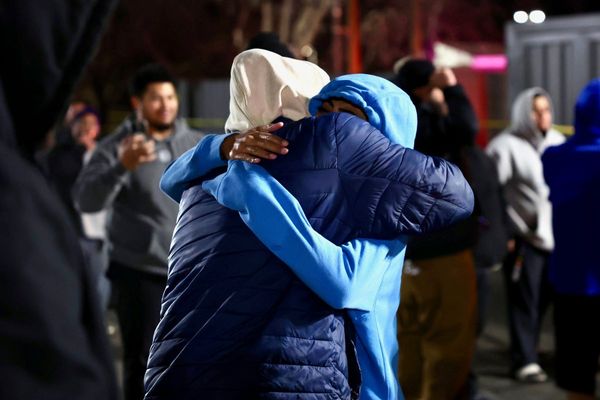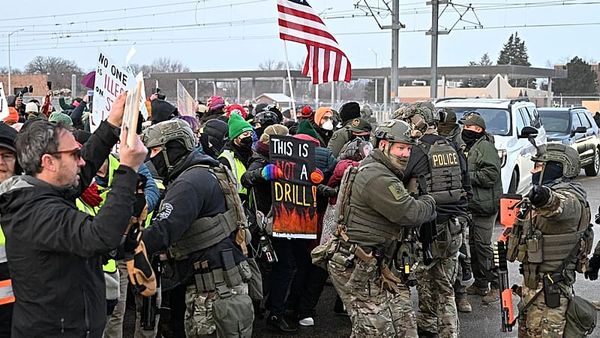
Arizona Democrat Adelita Grijalva was sworn in by Mike Johnson, the US House speaker, on Wednesday, ending a contentious seven-week standoff that prevented the incoming representative from taking her seat and clearing the path for a vote to release the Jeffrey Epstein files.
House Democrats burst into applause after Grijalva took the oath of office, in a floor ceremony that took place shortly before the chamber was poised to take up legislation that would end the longest federal government shutdown in US history. The House was already out of session when Grijalva won a late September special election to succeed her father, the longtime representative Raúl Grijalva, who died in March. Johnson, who kept the House in recess as a tactic to pressure Senate Democrats to compromise with Republicans on legislation to fund the government, had said he would not swear in Grijalva until after the chamber returned.
“It has been 50 days since the people of Arizona’s seventh congressional district elected me to represent them – 50 days that over 800,000 Arizonans have been left without access to the basic services that every constituent deserves,” she said in her inaugural speech on the chamber floor. “This is an abuse of power.”
Grijalva’s arrival does more than narrow the already razor-thin Republican majority. Moments after she was sworn in, she became the 218th and final signature on a discharge petition that automatically triggers a House floor vote on legislation demanding the justice department release additional files on deceased sex offender Jeffrey Epstein. In her floor remarks, delivered in English and Spanish, Grijalva said: “Justice cannot wait another day, adelante.”
The floor vote on whether to release the files is now scheduled to take place in early December.
Liz Stein and Jessica Michaels, survivors of Epstein’s abuse, watched from the House gallery, along with Grijalva’s family.
Earlier on Wednesday morning, House oversight Democrats released “never-before-seen” Epstein emails that mention Trump, including a 2011 message to Ghislaine Maxwell in which Epstein wrote that Trump “spent hours at my house” with a sex-trafficking victim, calling Trump a “dog that hasn’t barked”.
A 2019 email to author Michael Wolff states that “of course [Trump] knew about the girls as he asked ghislaine to stop”.
But lawmakers say many additional files remain sealed that for now leave unanswered questions about Epstein’s network and associates that a discharge petition will force the House to address.
The petition, introduced by Kentucky representative Thomas Massie and California representative Ro Khanna in early September, needed just one more signature to force a vote under House rules. Support has come overwhelmingly from Democrats, though Republican representatives Marjorie Taylor Greene, Lauren Boebert and Nancy Mace have also signed on.
Democrats accused Johnson of blocking Grijalva’s swearing-in specifically to prevent the Epstein vote. Senator Ruben Gallego of Arizona said that Johnson was “covering up for pedophiles”.
If the Epstein files legislation clears the House, it would still need Senate approval. But the vote itself would force lawmakers into an uncomfortable choice between voters demanding transparency about Epstein’s powerful associates and an actively discouraging Donald Trump administration that has pushed to avoid a deeper investigation.
Epstein, a financier with connections to numerous high-profile figures, including Trump, died in federal custody in 2019 while awaiting trial on sex-trafficking charges. His death was ruled a suicide.
While previous document releases have detailed some of his associations, lawmakers have argued that a significant tranche of information remains sealed in justice department files.
Johnson kept the House out of session following Grijalva’s victory as part of a strategy to pressure Senate Democrats to vote to reopen the government during the shutdown. The Republican speaker claimed he could not administer the oath while the chamber remained inactive, though Grijalva won a week before the shutdown began and no such House rule exists prohibiting the swearing in of newly elected members during recesses.
Democrats also widely rejected Johnson’s explanation, noting in a 180-signature letter that he had sworn in two Florida Republicans earlier this year while the House was out. Arizona’s Democratic attorney general, Kris Mayes, filed a lawsuit last month seeking to force Johnson to seat Grijalva.
“She has a proud family legacy, and we’re delighted to have her here,” Johnson said during the oath ceremony.
The speaker defended his actions by claiming he followed precedent set by former speaker Nancy Pelosi, whom he said delayed similar ceremonies for Republicans. He insists his decision had nothing to do with avoiding an explosive vote on Epstein-related documents, though that ignores an intense pressure campaign from Trump allies attempting to spare the president from attention due to his longtime social ties with Epstein.
In a fiery floor speech introducing the fellow Arizona Democrat, congressman Greg Stanton assailed Johnson for the delay in seating Grijalva.
“At one point, the speaker went on television and said, quote: ‘Bless her heart. She is representative-elect. She doesn’t know how it works around here.’ Bless his heart, because here’s how it should work,” Stanton said. “Let’s call it the Adelita Grijalva precedent – when the American people vote, this chamber respects their will and seats them immediately.”
Paul Gosar, an Arizona far-right Republican congressman, also welcomed Grijalva to the House, as she “follows her late father’s footsteps” in the chamber where he served for more than two decades. “Boy, it was some footsteps, especially with his bolo ties,” Gosar recalled fondly, adding: “I have no doubt she will bring to the halls of Congress the same energy that has defined her years of public service.”
In her remarks, Grijalva also paid tribute to her late father, honoring him as a champion for the poor and vulnerable who rose from vaquero to congressman.
“That is the promise of this country,” she said, adding that promise was “under serious threat”.
“Basic freedoms are under attack. Healthcare premiums are skyrocketing,” Grijalva warned. “Babies are being ripped away from their parents by masked agents. We can and must do better. What is most concerning is not what this administration has done, but what the majority in this body has failed to do: hold Trump accountable as a co-equal branch of government that we are.”







